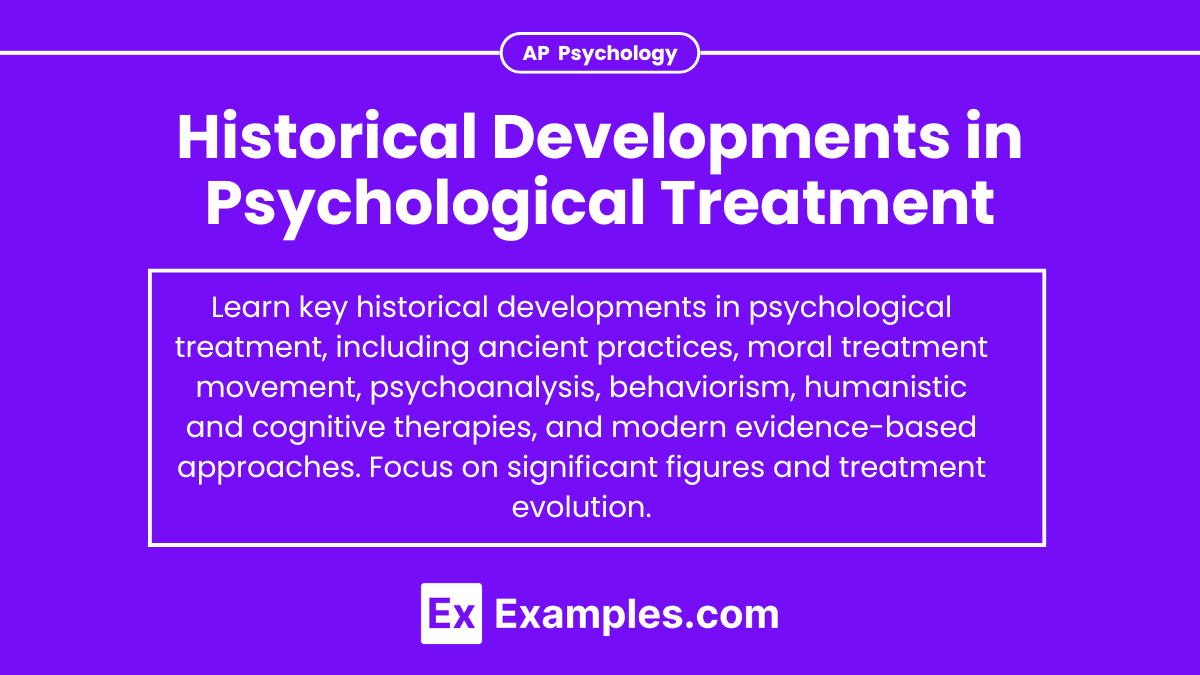The history of psychological treatment has undergone significant transformation, reflecting advancements in understanding mental health. From ancient supernatural explanations to modern evidence-based practices, treatments have evolved. Key historical developments include the moral treatment movement, the advent of psychoanalysis, behaviorism, and the rise of psychopharmacology. In AP Psychology, it's crucial to grasp how these changes have shaped current therapeutic approaches, emphasizing more humane and effective treatments in mental health care.
Learning Objectives
Focus on learning the evolution of psychological treatment, key historical figures (like Freud, Rogers, and Beck), and their contributions. Understand major approaches (psychoanalysis, behaviorism, humanistic, cognitive, and biological) and their treatment techniques. Recognize the shift from supernatural and harsh treatments to humane and evidence-based practices. Emphasize the impact of the moral treatment movement, psychopharmacology, and integrative approaches like the biopsychosocial model on modern psychotherapy.
The history of psychological treatment has evolved significantly over time, reflecting changes in cultural, scientific, and medical understanding. This evolution has shaped contemporary practices in psychotherapy and mental health care.
Early Approaches to Mental Illness
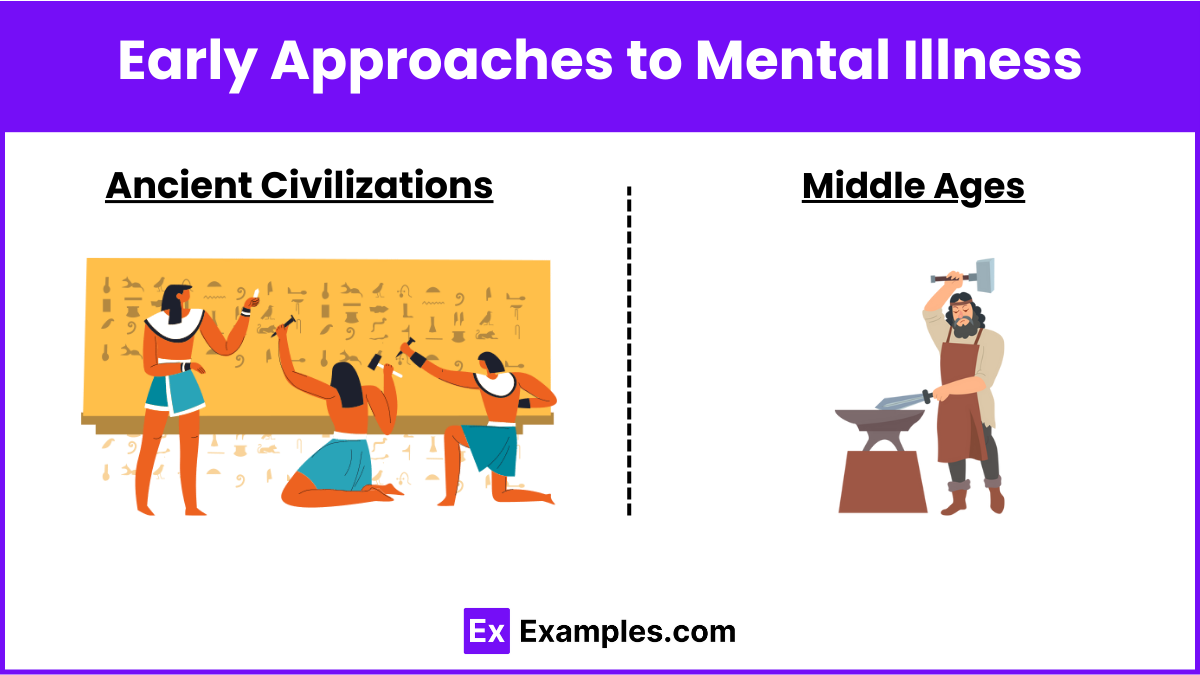
Ancient Civilizations
Egyptians, Greeks, and Romans: Early civilizations often attributed mental illness to supernatural forces. Treatments included exorcism, trephination (drilling holes into the skull to release evil spirits), and various rituals.
Hippocrates: Proposed that mental disorders were due to imbalances in bodily fluids or "humors" (blood, phlegm, yellow bile, and black bile). He suggested treatments like bloodletting, Diet Plan, and purging.
Middle Ages
Religious Explanations: Mental illness was frequently seen as demonic possession. Treatments were harsh, including exorcism, imprisonment, and even execution.
Asylums: The first asylums were established, providing more humane (though still rudimentary and often inhumane by today's standards) care.
The Renaissance to the 18th Century
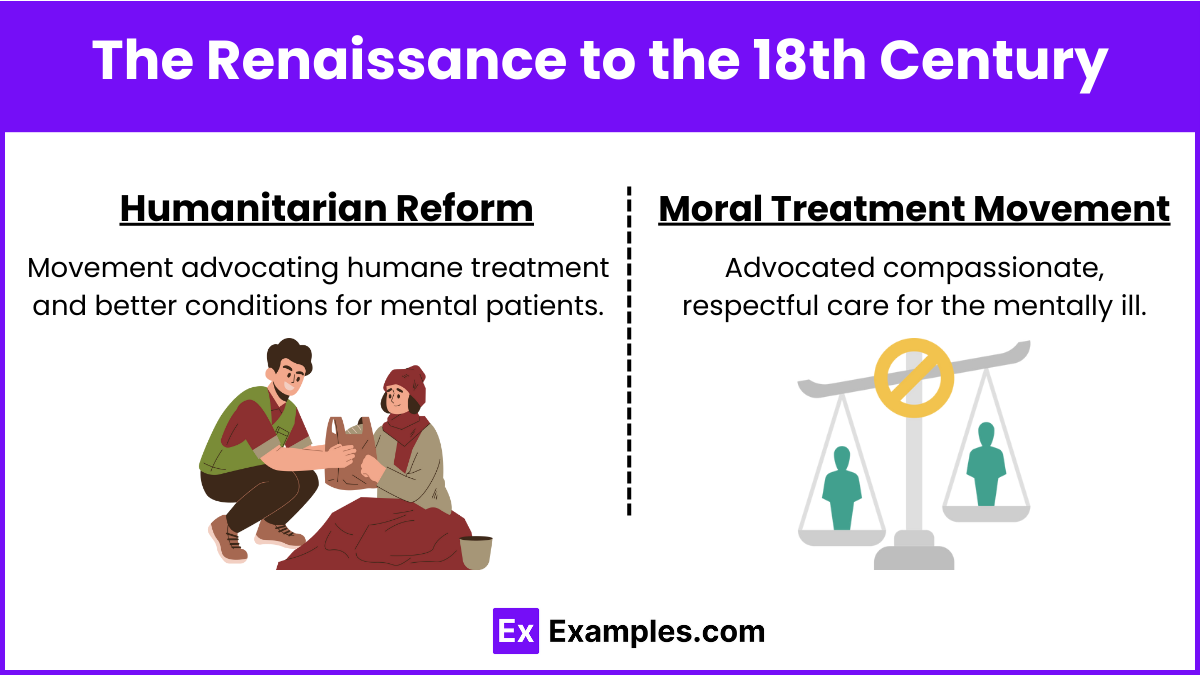
Humanitarian Reform
Philippe Pinel (France): Advocated for more humane treatment of the mentally ill, famously unchaining patients at the Bicêtre Hospital in Paris.
William Tuke (England): Founded the York Retreat, promoting a more compassionate and therapeutic environment for the mentally ill.
Moral Treatment Movement
Dorothea Dix (USA): Campaigner for the humane treatment of the mentally ill and the establishment of state hospitals.
Benjamin Rush: Often considered the "father of American psychiatry," advocated for better conditions and more ethical treatment of patients.
19th and Early 20th Centuries
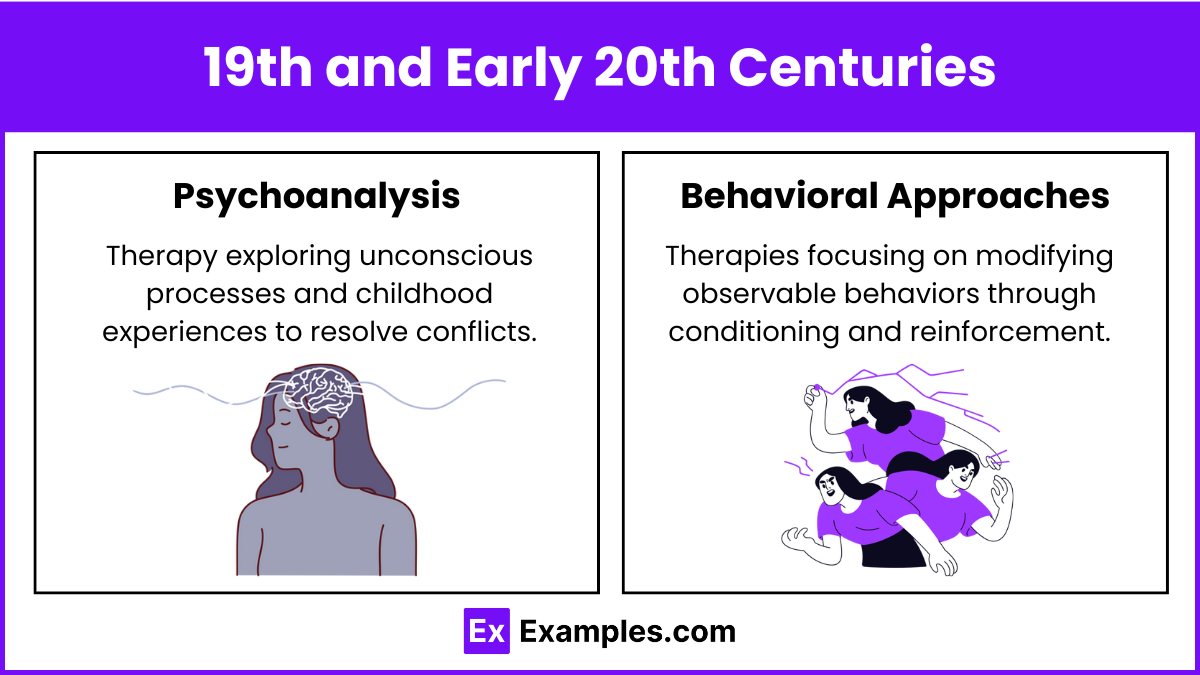
Psychoanalysis
Sigmund Freud: Developed psychoanalysis, emphasizing the role of unconscious processes and childhood experiences. Techniques included free association, dream analysis, and transference, using various literary techniques to explore the deeper meanings of patients' thoughts and behaviors.
Behavioral Approaches
Ivan Pavlov: Known for classical conditioning, which influenced behavioral therapy.
John B. Watson and B.F. Skinner: Pioneered behaviorism, focusing on observable behaviors and their manipulation through reinforcement and punishment.
Mid-20th Century Developments
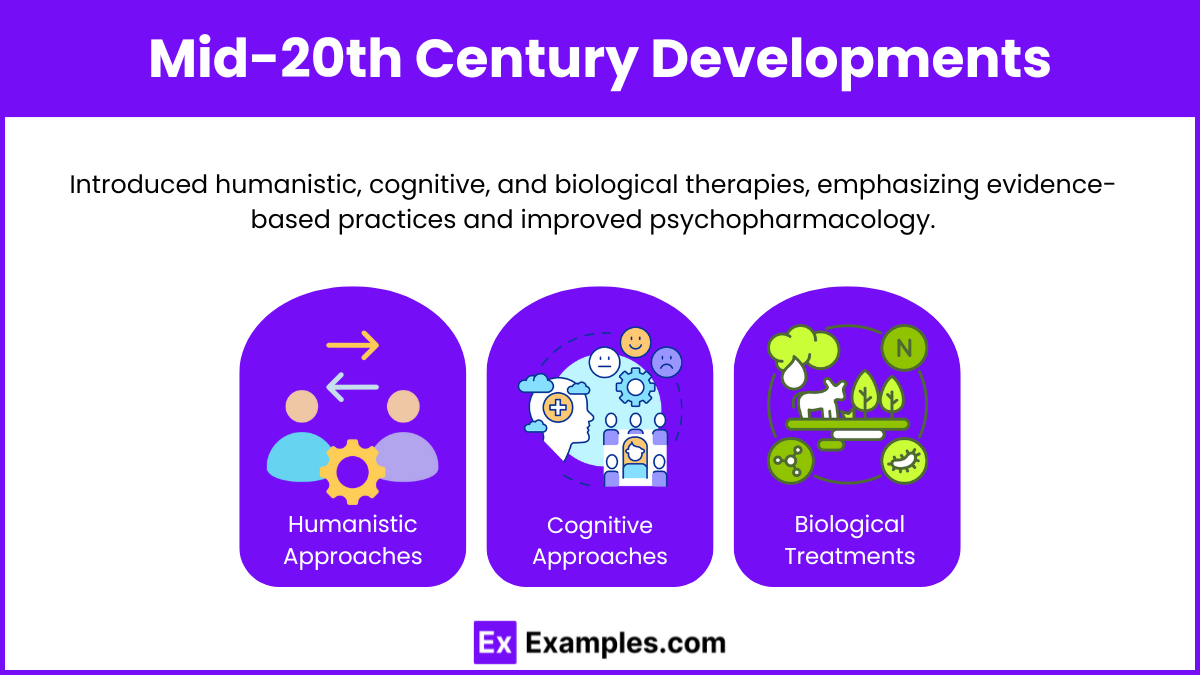
Humanistic Approaches
Carl Rogers: Developed client-centered therapy, emphasizing empathy, unconditional positive regard, and the therapeutic relationship, often incorporating techniques of positive reinforcement to encourage desirable behaviors and outcomes.
Abraham Maslow: Known for the hierarchy of needs and the concept of self-actualization.
Cognitive Approaches
Aaron Beck: Developed cognitive therapy, focusing on changing negative thought patterns.
Albert Ellis: Created Rational Emotive Behavior Therapy (REBT), addressing irrational beliefs and cognitive restructuring.
Biological Treatments
Electroconvulsive Therapy (ECT): Introduced in the 1930s for severe depression and other mental illnesses.
Psychopharmacology: Introduction of medications like antipsychotics, antidepressants, and anxiolytics revolutionized mental health treatment.
Late 20th Century to Present
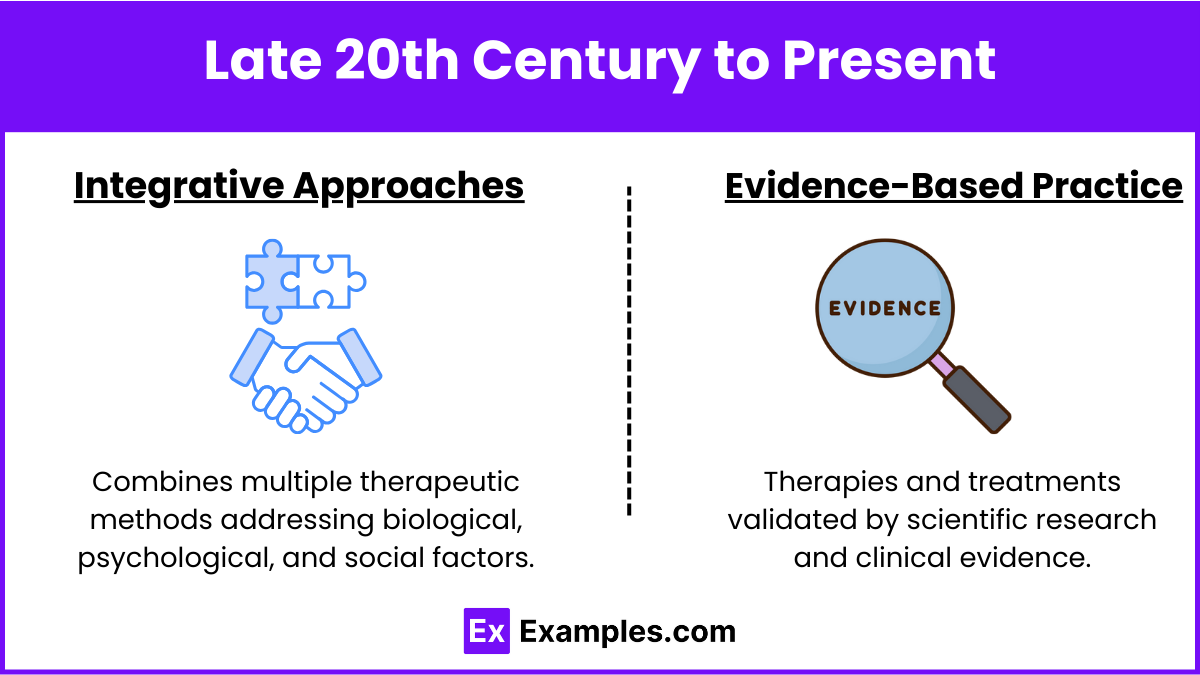
Integrative Approaches
Biopsychosocial Model: Emphasizes the interaction of biological, psychological, and social factors in mental health.
Dialectical Behavior Therapy (DBT): Developed by Marsha Linehan, integrates cognitive-behavioral techniques with mindfulness for treating borderline personality disorder.
Evidence-Based Practice
Focus on treatments supported by empirical research.
Use of randomized controlled trials (RCTs) to validate the efficacy of psychotherapies and medications.
Modern Psychotherapy Modalities
Cognitive Behavioral Therapy (CBT): Widely used for a range of disorders, combining cognitive and behavioral techniques.
Mindfulness-Based Therapies: Including Mindfulness-Based Stress Reduction (MBSR) and Mindfulness-Based Cognitive Therapy (MBCT), focusing on mindfulness and meditation practices.
Acceptance and Commitment Therapy (ACT): Combines mindfulness with commitment to personal values and behavior change.

